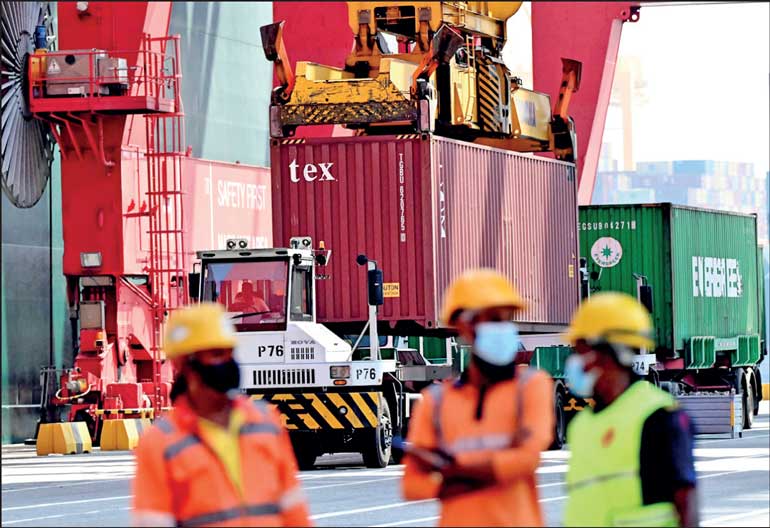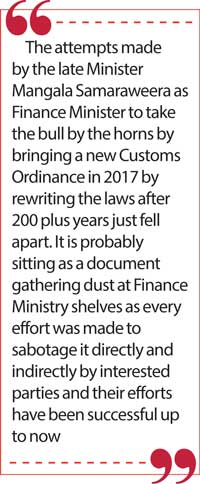Friday Feb 20, 2026
Friday Feb 20, 2026
Friday, 15 September 2023 00:15 - - {{hitsCtrl.values.hits}}

 I quote below the Cabinet decision on 11September 2023-
I quote below the Cabinet decision on 11September 2023-
Quote
Amendments made at the committee stage in relation to the draft Value - Added Tax Act No. 14 of 2002. The concurrence of the Cabinet of Ministers has been granted to submit to the Parliament the draft bill prepared by the Legal Draftsman in order to revise the Value – Added Tax Act No. 14 of 2002 including the repeal of simplified value - added tax scheme (SVAT) with effect from 01.01.2024. The representations made by the relevant parties point out that drastic issues may erupt in finance flow in relation to individuals especially the exporters who have been registered under the system at present if the simplified value – added tariff system is repealed without a strong value – added tax repayment system. Therefore, it is apparent that it is appropriate to repeal the simplified value – added tax system step by step until a strong tax repaying mechanism is established. Accordingly, the Cabinet of Ministers approved the proposal furnished by the President in his capacity as Minister of Finance, Economic Stabilisation and National Policies to submit a proposal for revision of the date of implementation of the relevant provisions to repeal the simplified value – added tax as 01.04.2025 when it was taken for discussion at the committee stage of Parliament for discussing the value – added tax (amended) bill-
End Quote
The above Cabinet decision with the intervention of the President speaks for itself that systems have to be implemented after testing with careful proven mechanisms that would not hinder the cash flow of exporters and businesses.
Trade facilitation and single window has been in the agenda for well over two and a half decades in Sri Lanka, but little progress has happened except for few patches and payment gateways. The reality is that the institutions continue to operate inefficiently with partial manual and dual systems being adapted making the work more cumbersome and opening the door to more corruption than before, taking refuge in old laws whenever reforms and technology is being introduced for a process.
I recall in 2002 when incumbent President Ranil Wickremesinghe was elected as Prime Minister, the Finance Ministry had a two-day workshop named “De-Reg” at a Marawila resort, where the first discussions were held on simplifying systems to support trade growth and bring in a new Customs Ordinance. I was invited as I have represented the trade facilitation committees since 1997 at Customs to implement the first stages of the ASYCUDA Customs process. Since then up to 2018 the progress was nil but lethargic and none focused by key institutions and successive governments.
Automation and single windows buzzing words only
 Automation and single windows have been buzzing words that never properly saw the light of day for decades. The National Export Strategy (NES) of 2017 targeting Rs. 20 billion export revenue by 2020 highlighted the need for urgent reforms but that too is yet to take off.
Automation and single windows have been buzzing words that never properly saw the light of day for decades. The National Export Strategy (NES) of 2017 targeting Rs. 20 billion export revenue by 2020 highlighted the need for urgent reforms but that too is yet to take off.
The attempts made by the late Minister Mangala Samaraweera as Finance Minister to take the bull by the horns by bringing a new Customs Ordinance in 2017 by rewriting the laws after 200 plus years just fell apart. It is probably sitting as a document gathering dust at Finance Ministry shelves as every effort was made to sabotage it directly and indirectly by interested parties and their efforts have been successful up to now. In my opinion without greater reforms coming from Customs starting at the legal division, along with Ports and the Inland Revenue Department (IRD) to start the single window process within the respective institutional framework, is a waste of time to talk of a national single window linking the rest of the institutions. They are the three key institutions.
On the VAT front, many knew and spoke about the SVAT as Simplified VAT and took it back to only 2011. The fact is it was originally called “Suspended VAT” for exporters only. Since 2005 it has been running effectively for cash flow management as an innovation mainly developed with the apparel industry since the online system remained a distant dream then and to date.
Customs, IRD, unprepared for speedy refund system
The VAT system is directly linked to Customs and the IRD, both institutions totally unprepared for the speedy refund system needed for both, the Government and exporters to have an efficient cash flow management system. I could remember around the period of 2005/7 the two largest apparel companies alone had over Rs 1. 5 billion outstanding refunds for many years and every week we used to have a meeting to get the refunds that were blocked and delayed one way or the other.
From the exporters’ point of view, the SVAT (Suspended) system was functioning well under the TQB and EDB until 2011 and it offered greater comfort and relief when compared with the VAT refunding system in Sri Lanka prior to the implementation of suspended VAT. The VAT Deferment Facility offered under the TQB and EDB was strictly limited to the direct exporters, and for suppliers to the direct exporters (deemed). Thus maintained was the sanity of VAT principles.
In 2011, the Government brought the system under the administration of the IRD to enhance VAT services, disregarding the VAT deferment facility implemented to exporters because of their right to get back 100% of the input tax. But the IRD went ahead from suspended VAT to Simplified VAT in 2011 and created an environment where the domestic industry was also given the simplified facility with 50% supply criteria for registered purchases. This is where the revenue erosion could and would have come as proper automation was a long way away. Other developed nations have implemented transparent refund systems where the cash flow is fast and effective. The authorities must realise that reforms have to happen both ways rather than cherry picking systems to satisfy government coffers at the expense of the export industry, considered the number one industry that needs to be facilitated at this moment.
Data on trade is inaccurate
I have always maintained that to date the data we have on trade is not accurate. As I write this article over 1,500 export entry releases have not been updated to the customs system which gives wrong numbers to the Finance Ministry and the Central Bank on trade figures where they depend on the same for decision making. I have pointed out the same to the President when I had had the opportunity to do so. If fundamentals are not fixed, the rest of the systems are not going to work in reality.
I believe the President’s interventions as per the Cabinet decision is prudent and timely, as exporters who have no special treatment today for competing were relying on innovative indirect trade facilitation safeguards from an unproductive system that we have today. A refund system built on manual processes with human intervention at every possible time is simply a recipe for disaster.
The solution and a way forward:
1.The most important function is to start the single window within the Customs Department for all its services as we see in developed countries rather than jumping into a national single window which is a nonstarter. Customs systems and its law is 50% of the problem along with the IRD and its systems linking the trade. Until such time any refund system would only lead to possible delays and corruption.
2.The Government may fully abolish the Simplified VAT introduced in 2011 and revert to the Suspended VAT system that prevailed from 2005 to 2011 more fully described in the manual of Value Added Tax law issued by the department, incorporating all amendments made up to 2005 strictly limiting to exporters and deemed exporters.
3.Establish a pilot project for the non-export sector where the Government can start demonstrating a successful speedy refund mechanism with simple online documentation and get the confidence of the business sector before rethinking the VAT to be collected through exporters in 2025.
(The writer is the CEO of Shippers’ Academy Colombo and founder of Shippers’ Academy International. Full profile available on LinkedIn)